Leave it to writer/director Gina Prince-Bythewood, the driving force behind the award-winning “Love & Basketball” and “The Secret Life of Bees”, to jump into the callous coldness of the music industry as her newest playground with “Beyond the Lights”. An emotionally powerful film that digs deep behind and beyond the lights, “Beyond the Lights” is, in many respects, a cautionary tale not only about “the business” but about the relationship between parents and children; fathers and sons/mothers and daughters and the desires and pressures on both sides of every relationship, all told through the eyes of Noni, a true talent coming into her own as a woman, trying to find her own voice and not her mother’s, and make it be heard in the world.
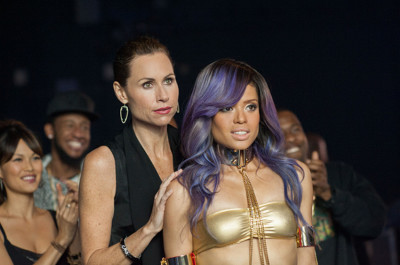
We first meet Macy Jean and her 10-year old daughter Noni in 1998 London where Macy Jean is doing more than a “Mama Rose” head game on Noni. Noni, a bespectacled shy girl with uncooperative unruly natty hair, clearly loves to sing, although she may not love to perform. Pushing and driving Noni to win a local talent contest, one is immediately swept into the frustrated stage mother syndrome as Noni, coifed, dressed and posed to Macy’s specifications, comes in second despite a through-the-roof acapella performance of Nina Simone’s “Blackbird”. While Noni is thrilled to have won a trophy, same can’t be said for Macy Jean who manhandles the child, ragging her from the contest, hauls her out into the parking lot, chastising and lecturing in the same breath, “You wanna be a runner-up? Or do you wanna be a winner?’ Due either to fear of her mother or an inner desire to truly be a winner, Noni smashes her trophy onto the ground.
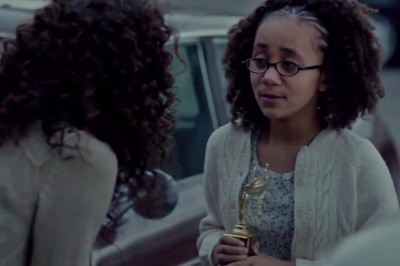
Fast forward to present day and Macy Jean is in high-powered manager mode, having led Noni to stardom thanks to triple recordings and a beyond sexually suggestive music video with the hottest superstar of the day, a white rapper named Kid Culprit. No longer the adorable little girl singing “Blackbird”, Noni is now tricked out with weaves and chains and barely-here-clothes with an offensively arrogant attitude to match, as she writhes on stage with the hottest platinum selling rapper of the day, Kid Culprit, at the Billboard Awards. But something doesn’t feel right, particularly as you watch Noni and Macy Jean on what should be on the happiest nights of their lives given the awards Noni and Kid just racked up.
Back in her hotel, instead of resting, Noni attempts a swan dive off the upper level balcony of her hotel, only to be rescued at the last second by off-duty LAPD officer, Kaz Nicol, doing extra duty as a bodyguard. While Macy goes into spin mode for the press, dismissing the incident as a “trip and almost fall” due to too much celebrating, and while Kaz is being hailed as hero, something else is playing out “beyond the lights.” While paparazzi are digging deeper believing there’s more to the ‘accident” than Macy is saying, Kaz “sees” Noni for who she really is, something that intrigues Noni.
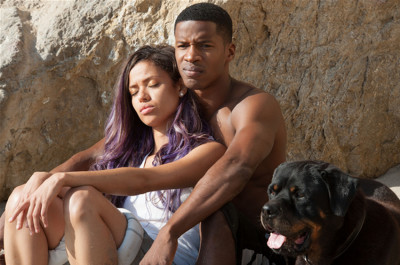
As a relationship begins to blossom between the two, we begin to understand how much alike they are. We see how Macy operates and thinks, with Noni nothing more than a commodity. But we also start to learn about Kaz’ life as the son of a single father, himself a respected police captain who is also strategizing his son’s career for political office, just as Macy has been doing all these years with Noni.
The closer Noni and Kaz get, the more each starts to think for themselves and try to make a move from under their parents’ respective thumbs. And while neither parent thinks their child is good enough for the other, the one thing they agree upon is that they must keep the kids apart. With the record label threatening to drop Noni and political backers threatening to withdraw support of Kaz, can Noni and Kaz find their voices or will their parents drown them out.
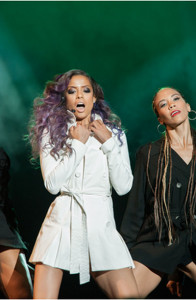
Gugu Mbatha-Raw is luminous. And talk about chameleonic! Kudos to hair and make-up for the slutty star persona look they achieve in transforming her as Noni, but there’s not enough applause possible for Mbatha-Raw herself for delivering an emotional performance that is not only powerful, but emotionally and physically freeing. Particularly inspiring and illuminating is an outdoor concert scene that allows Noni’s true personality, warmth and pure ebullient peace and joy radiate on screen. A magical moment. Mbatha-Raw is so emotionally pure and visceral, you can almost feel the weight of the burdens of life lifted not only from the character but from yourself sitting and watching.
As co-star Tyler Christopher, who plays record executive Liam King, describes Minnie Driver, “She scared the hell out of me!!” in not only one of their scenes together, but in a climactic kitchen scene between Driver and Mbatha-Raw, he’s right on the money with that assessment. Minnie Driver is riveting as Macy Jean. She is pure perfection as the driving, calculating, demanding “stage mother/manager from hell”. Perhaps the most pivotal and powerful scene in the film – and one of Minnie Driver’s ultimate best single scenes over the course of her career to date – is the Noni-Macy “come to Jesus moment” kitchen scene or, as I like to call it, “the slap heard round the world” moment. Did Driver even take a breath? And a slap to her child with such a fluid forceful arm movement. It shocks you to the core just watching. Beautifully done on both parts with the calm confidence that Mbatha-Raw gives Noni in that scene and the ice cold rage that Driver brings in retaliation and reaction to Noni’s defiance to Macy’s iron fist. And it’s this dynamic that gloriously fuels the mother-daughter relationship.
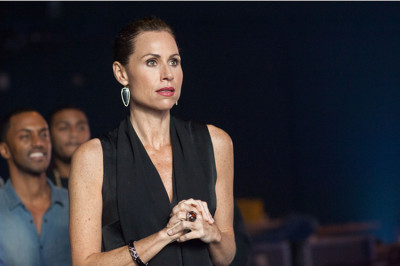
According to Driver, for the kitchen confrontation and similar scenes to work, “[I]t has to begin in a really familiar place that is honest and truthful, and you can’t be sending messages about what’s coming. . .You’re either going to get there or you’re not going to get there. There’s no, ‘Well, we’ll cut and we’ll come back in and pick it up. They’ll blow tear sticks in your eyes and you can get all…’. It’s like, ‘No, you’ve got to get there. If you don’t get there, then we’ll do it again until you do.’ But that’s the best kind of scene if you’re interested in acting, because they’re the hardest ones to do where you really have to start 180 degrees away from where you end up. You have to find that journey. And that’s playing; that’s doing. For me, that’s what I get paid for. That’s the piece that I love the most. . . And you have to do it with somebody really good and have a really good director that will let you do that.” As producer Stephanie Allain notes, “Being on set that day was very, very powerful. We were all literally crying. It was just a really impactful scene.” Interesting is that while Driver makes the scene and the physicality of the “slap heard round the world” look and feel so believable, it wasn’t full on reality. “That was actually the only frustrating bit because it was a stunt. I just couldn’t quite get the angle. That was difficult for me to do.” But showing the chemistry between herself and Mbatha-Raw, both burst into laughter as Driver jokingly admit with a wide grin, “I really did want to smack her! I’m sure [to Mbatha-Raw] you’ve done something in your life that’s worth a smack!”
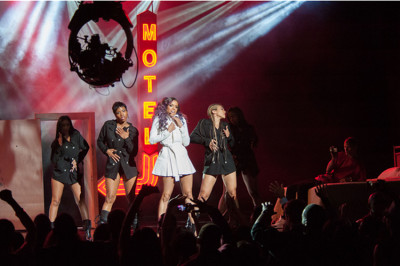
For Mbatha-Raw, “That scene was my favorite scene when I first read the script in 2011, and it was my favorite scene to shoot. And it’s my favorite scene in the movie. It’s one of those scenes that we’ve just been waiting to happen through the whole movie, because it’s the turning point when Noni finally literally finds her voice and not just on a singing level, but has the confidence and courage to confront her mother and to express some home truths and all of the things that she’s been suppressing over the years. For me, it was explosive and I felt it was such a gift to work with Minnie. . .we really had to lock horns.”
But the emotion and distinctive persona is not exclusive to the ladies. As Captain David Nicol, Danny Glover then easily handles the role of quietly pushy father. The two parenting styles are wonderful to watch with each driving their child emotionally further from them. Terrific character construct with the parallel worlds.
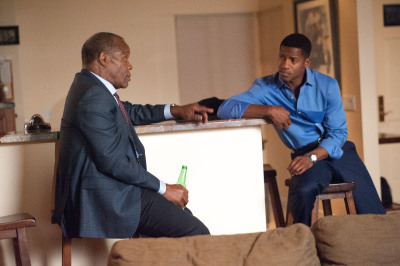
And then there’s Nate Parker. Quietly commanding as Kaz, you feel a sincerity that just emanates from him with very few words. Interesting is to watch Parker and Glover as Parker has the ability to effect tiny nuance to speak volumes; like, screwing his lower jaw slightly and adding just the slightest eyebrow raising in questioning silence of what his dad is pushing him to do. Similarly, Parker is beyond effective when embodying the shock and awe at the haranguing of the paparazzi and the uncomfortableness that comes with being a significant part in the life of someone who is their focus. Just a snippet of reality that really nails today’s world.
Nate Parker wistfully reflected on the experience, wishing Danny Glover was by his side talking about the film during the recent press day. “That relationship is one that I will always cherish – from rehearsal until the first time we did a scene, until the last time we had an opportunity to do a scene, until the last time we actually had the opportunity to see each other. He still calls me ‘son’ and I still call him ‘pop’.” Making the father-son relationship between Kaz and captain Nicol even more powerful is Parker’s own life. “My father passed away when I was very young. Being someone who comes from a single parent household, you have ideas of what your life would have been like if you had a father in your life, the effect he would have had, the kind of wisdom he would have imparted on you, and what you would have wanted to do to make him proud. So, this relationship was very special to me.”
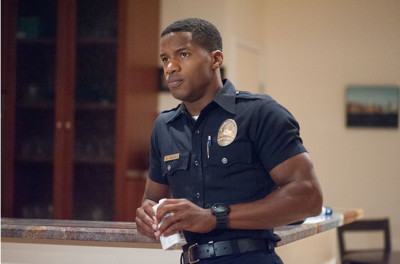
Reflecting on Glover’s character, Parker notes, “Here’s a man who’s stood in the gap in a time and in an environment where in this community there are not many father-son relationships that you see that are happening in a healthy way. So, to see this man want nothing more for his son than for him to go to law school and educate himself, get an education around creating change and policy, and then go into politics and eventually try to follow in the footsteps of President Barack Obama, they’re all positive and good things. However, nonetheless, it was a projection of what he wanted for my character’s life.” Using that as fuel for his own performance, Parker opines on Kaz’ motivations. “There was no opinion about [Kaz’ life] until he looked into [Noni’s] eyes and he saw her experience. He saw from this macro level of what was happening in her life that there was a congruence, that what was happening to her was happening to him. Then you saw this relationship with his father start to turn, and it didn’t turn in a way that was obvious like, ‘Dad, you’re trying to destroy me and smother me.’ It was more like, ‘What if I did something that I loved? What if I pursued something that meant something to me? What would that look like?’ I think that the more important thing is the reaction from the father.” Parker gives full credit to Prince-Bythewood for “this healthy place” for the relationship between Kaz and his father. “It was complex and I enjoyed playing it.
But it’s the dynamics of Noni’s journey and that of Kaz which drives the emotion and the reactive nature of the child-parent relationships, as does the freshness and joy that erupts between Mbatha-Raw and Parker.
Strong supporting performances not only come from Tyler Christopher, who delivers a solid presence as Liam King, but R&B superstar Machine Gun Kelly aka Richard Colson Baker who plays Kid Culprit. A standout and someone to put on your radar is India Jean-Jacques as the young Noni.
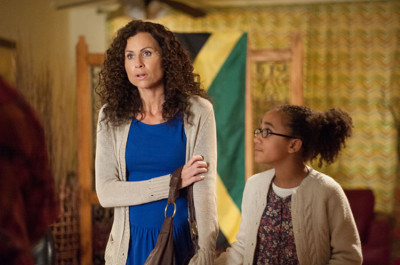
Writer/Director Gina Prince-Bythewood knows her story, fleshes it out relatively well with great focus on the parent-child relationship from which all else stems and gives a voice to those desperately trying to find one. What could have been a worn-out “been there, done that” story in the hands of a lesser director, thanks to Prince-Bythewood, there is an integrity and intelligence that elevates the characters and the film as a whole. A consummate storyteller, she delivers a story that shows that relationships between parent & child knows no socio-economic bounds. Wealthy, jet-setting entertainment folks have the same things going on as middle class blue collar as lower middle class. Parents all want a better life for their kids and unfortunately, no matter where in the world, will push and push to have them achieve it. The characters are constructed so that we see variations of the parenting techniques and beliefs and what is deemed of importance to each character and how that impacts each child. For Glover’s Captain Nicol, it’s not money; it’s power to help others through politics. For Driver’s Macy, it’s money to help her run from poverty and from being “a nobody” making her an ultimate pushy stage mother from hell, using her daughter to compensate for her own failures. It’s refreshing and welcome to see Prince-Bythewood develop the parents so that each has it built in them to justify whatever they do. But it’s the emotion journey and transformation of Noni and even Kaz, that is simply magical to watch unfold as each grows and steps up and steps out from under the thumbs and ideals of their parents.
Keeping the camera fluid, Prince-Bythewood calls on cinematographer Tami Reiker and together the two develop a visually metaphoric storytelling, using extensive close-ups and mid-shots early in the production for the claustrophobic world in which Noni, as well as Kaz, lives, but then widening out as Noni and Kaz “find themselves” ultimately delivering stunning wide-angle panoramic shots for the last act of the film. Lighting is significant, particularly in a Rosarita Beach sequence, capturing a celebratory warmth with a setting sun as backlight, golden shadows, sun flares. Similarly, a climactic outdoor concert is lensed with the bright white of day, blue skies as a sense of freedom takes hold.
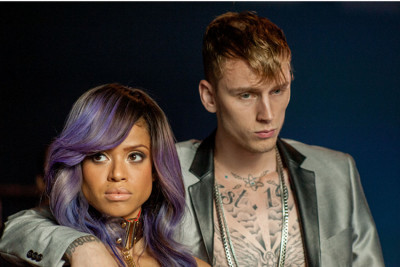
A critical element of the film’s construct is the music. Soundtrack and scoring is dynamic, pulsating and telling, with songs specifically written for the character by Richard C. Baker and Terius “The Dream” Nash, among other notable R&B tones. And yes, it is Gugu Mbatha-Raw doing all of her own singing and stage performance in the film. For Prince-Bythewood, “It really started with Noni’s original music and knowing what we needed for that. Early on, the only target I had was The Dream. I knew that he could do the raunch at the beginning of the movie, but also write beautiful love songs like he does for Beyonce, and I wanted somebody at that level. We had to believe her songs would be playing with the radio. This being a music film, music was everything to this, so it started there with his original music and the work that both Debra Byrd [Mbatha-Raw’s vocal coach] and The Dream did with Gugu in the studio. And then, just as a whole, with the soundtrack, it was very important that the music mirrors her trajectory. I wanted to have a balance between established artists like Beyonce, but also some newcomers like Cynthia Erivo, who has such a beautiful track, and Yuna. . .As the story progresses, we had more of that singer-songwriter vibe to it, which is where Noni was hoping to go.” Calling herself “very very fortunate”, Prince-Bythewood gives props to producers Allain and Reggie Rock Bythewood, especially when it came to Machine Gun Kelly, not only to play Kid Culprit but for his music. “I knew I wanted a real hip hop artist, and that’s something that Stephanie, Reg and I talked about a lot, about bringing that authenticity, and that was tantamount for this film. In pushing for [MGK], it was a bit of a fight and the fact is they had my back in terms of wanting to go that way.”
Wonderful and warm, “Beyond the Lights” is emotionally freeing and inspiring! An emotional journey of finding one’s voice that will resonate with all, “Beyond the Lights” lifts the heart and the soul.
Written and Directed by Gina Prince-Bythewood
Cast: Gugu Mbatha-Raw, Nate Parker, Minnie Driver, Danny Glover, Tyler Christopher, Machine Gun Kelly












